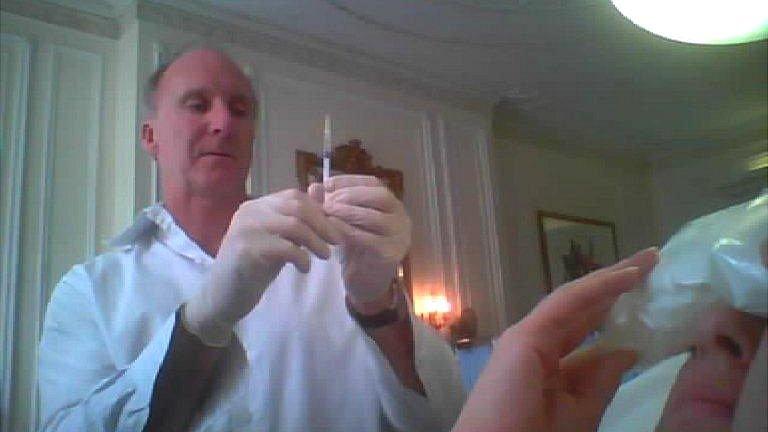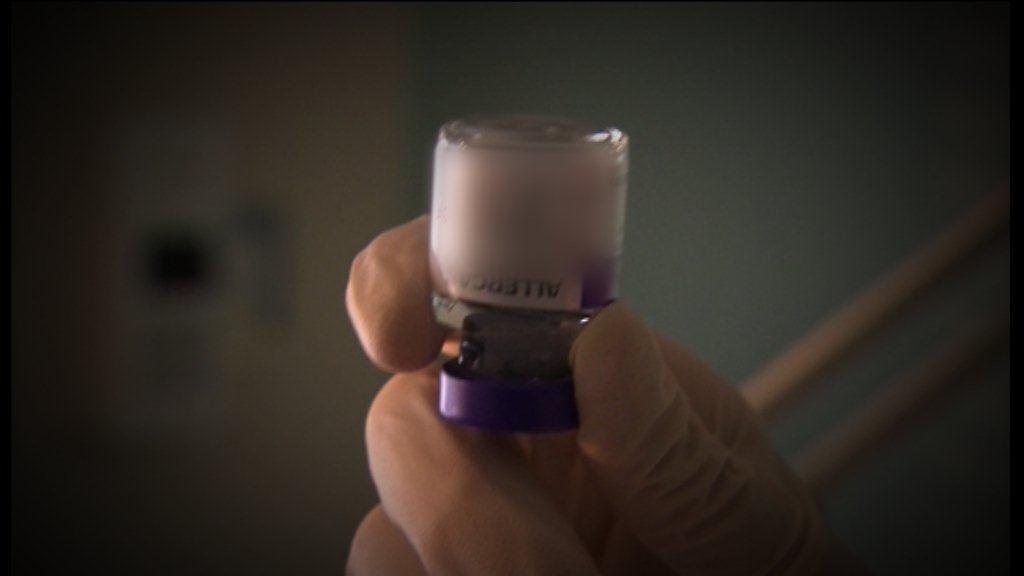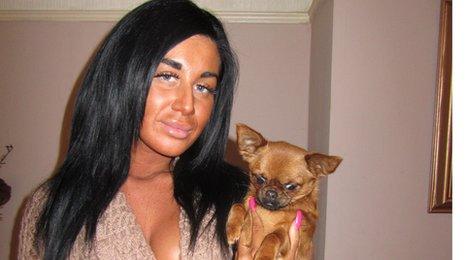Harley Street doctor suspended over Botox practices
- Published
The case was brought after BBC London exposed his techniques in undercover recordings during an investigation.
A leading Harley Street cosmetic doctor has been suspended for 12 months after being found to have acted "dishonestly" and encouraging nurses to obtain Botox illegally.
Dr Mark Harrison was first exposed by an undercover BBC London investigation charging nurses £400 a day for training.
A nurse went undercover posing as a trainee to secretly film the doctor during an introduction to Botox course and his practices were later recorded on the phone by BBC undercover researchers.
Suspending Harrison for twelve months, Medical Practitioners' Panel Chair Dr Janet Nicholls said: "The panel has determined that his conduct is serious, wide ranging and included dishonesty" and "did involve serious breaches of good medical practice"
Emergency practices
Botox can only legally be administered by a doctor to a patient with a valid prescription.
Prior to the tightening of the laws, Dr Harrison authorised nurses to perform the procedure by speaking to them on his mobile, despite the fact this was only supposed to happen in exceptional circumstances.
He charged £30 for each consultation - and offered a day-long training course at his practice, Harley Aesthetics, to prepare nurses who wanted to administer Botox, which makes the skin smoother and is commonly used as an anti-wrinkle treatment.
Hundreds of nurses worked for him from his Harley street headquarters, earning his business millions of pounds from remote consultation fees and the supply to them of anti-wrinkle drugs.
At his training courses, Harrison told nurses to use Botox on one patient even though it was prescribed for someone else.
He was secretly filmed telling the nurses: "Well, you know in reality, we don't use one vial for one person."
He stated: "You're probably using it on that patient and somebody else or maybe you are not. You know, it's one of those".
When asked by an attendee about ordering Botox for a client later that week, Dr Harrison stated "Just order a vial in your name", adding later: "It's not policed at all."
The doctor first denied wrongdoing, but he received an interim suspension immediately after the BBC's investigation in July 2012.
Businessman 'not doctor'
The hearing for the General Medical Council, which looked at the evidence against him, deemed that his fitness to practise medicine was "impaired".
The panel rejected claims that Dr Harrison had been a victim of entrapment by the BBC.
Immediately following the BBC's investigation, the GMC tightened the laws banning medicines such as Botox from being prescribed remotely, meaning they must now always hold a face to face consultation with the patient for these types of cosmetic drugs.
"He was running his practice as a business not as a doctor, he was betraying the trust of his patients," said Rajiv Grover, of the British Association of Plastic Surgeons (BAAPS), who referred to the BBC investigation in 2012 as "groundbreaking".
Dr Harrison was also found, through examination by the panel of conversations with a BBC undercover researcher, to have not verified a patient's identity or their medical history and not undertake a medical assessment when issuing a prescription for Botox.
'Misleading and dishonest'
The panel did not find that Harrison had actually issued Botox in the name of patients or encouraged nurses to administer the drug without a valid direction, after treatment had taken place.
He was cleared of several other misconduct charges, including a claim that he encouraged nurses to top up Botox with a saline solution; encouraged attendees at his course to ignore a patient's medical history; or informed them administering Botox without a prescription was within their industry guidelines.
He was not represented and did not attend the panel's determinations in Manchester but had previously denied to an interim hearing in 2012 that he had said that nurses could order Botox in one person's name for use by another. The panel later described these specific comments as "misleading".
Harrison also denied saying that nurses could go ahead with treatment if they could not reach him on his mobile to perform a remote consultation, which the panel referred to as "misleading" and "dishonest"
The panel chair said that it did not believe that Dr Harrison's behaviour demonstrated a "reckless disregard" for patient safety and that he "genuinely believed the practices were safe."
"Suspension is a serious sanction and that it sends out a signal to Dr Harrison, the profession and the public about how seriously the panel views Dr Harrison's misconduct."
- Published19 January 2015

- Published24 July 2012

- Published9 July 2012

- Published10 July 2010
- Published17 May 2011

- Published7 April 2011
